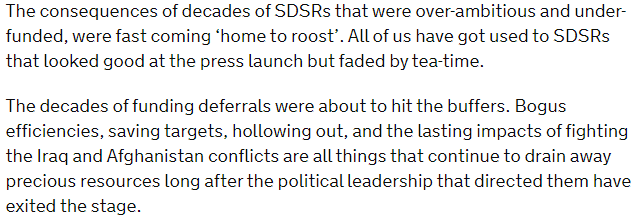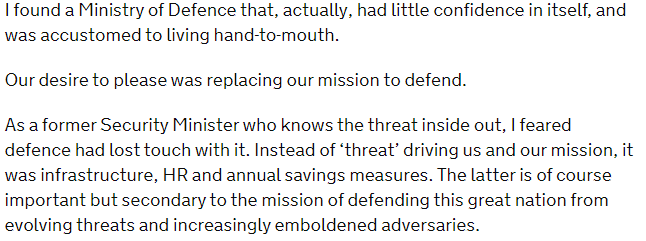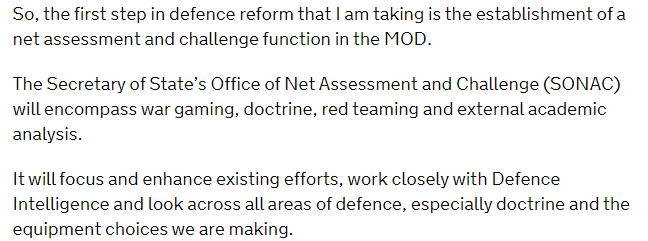The Defence Secretary gave a speech @RUSI_org this week to talk about defence reform. Although he couldn't go into much detail, with the Integrated Review still to be finalised, there are a couple of interesting points in here. (thread) https://www.gov.uk/government/speeches/defence-secretarys-speech-on-defence-reform
He's quite candid about previous problems matching funding and ambition. That might be regarded as uncontroversial now, but it's still noteworthy given all of the recent reviews (2010, 2015, and the NSCR in 2018) involved his political party.
The next bit is just as interesting; this is a particularly pointed criticism of his own department, and not just the previous political leadership.
It implies the need for a re-examination of the mindset of the MOD, and not just its processes and systems (though worth once again pointing to The Good Operation as something which should now be part of rebuilding the policy 'brain' of the department). https://www.gov.uk/government/publications/the-good-operation
Some of that is set out in other parts of the speech, where the Defence Secretary sets out again his views. This discussion of the difference between war and peace is a common theme for the Defence Secretary, and seems to be the driving force for much of his thinking.
But the question is, what does this mean? What are the implications? It is often phrased, as it is here, as a vulnerability and, moreover, a criticism.
If so, what is the response? The suggestion is that this division is an unhelpful one and we are too focussed on 'risk matrixes' (sic). Reforming bureaucracy is one thing, but the fact is our 'legal' approach is usually espoused as a strength.
It is often the *source* or foundation for our criticism of the behaviour of others, like Russia. This government has said that the 'Global Britain' agenda is one based upon a 'rules based' order and the UK encouraging others to behave 'responsibly'.
@PatPorter76 and others would no doubt point out the many examples of Western hypocrisy on this score, but it forms a central part of our rhetorical argument and soft power case when acting internationally. We use a legal division between peace and war because we see value in it.
This speech seems inconsistent as to what it is arguing, as it both highlights the 'misbehaviour' of others, and then suggests that the framework we use to make that criticism is itself flawed.
It could be read as saying we need more legal 'flexibility' in our approach. But at the same time, we consistently argue that new capabilities, like offensive cyber, will be used in line with the existing legal framework, and contrast our approach with that of our adversaries.
The way our adversaries act is driven as much by Western strengths as weaknesses. This is *conventional deterrence* in effect. Most try to avoid a direct fight, because they know they are unlikely to win, at least without massive costs.
And where political will has been lacking, and the conventional deterrent has been weak, they have acted. We still seem to present Ukraine as some sort of information operation, when it was an invasion enabled by probing Western willingness to respond *conventionally*.
And in that respect, the speech rightly suggests a much broader ability to compete and deter aggression is necessary. It just doesn't expand on a) what it means on the legal framework and b) what the *military* role is in this.
The rest is then a pivot onto some nods about announcements to be made next year when the IR concludes, but where details can't be given yet, for example on the reduction but not elimination of armour.
One interesting announcement is the creation of a 'net assessment' unit to help the MOD learn and adapt more quickly. The functions are not new; there is already lots done on wargaming, lessons and analysis, but the UK has not, until now, had a single coordinating point.
The US Department of Defense has had an Office of Net Assessment for a long time; this new MOD unit appears to copy some functions, but also have a very broad remit. It's an area back in vogue on the other side of the Atlantic too. https://thestrategybridge.org/the-bridge/2020/11/19/the-department-of-defense-needs-to-relearn-the-almost-lost-art-of-net-assessment
While the speech doesn't provide much detail, there are therefore some ideas to chew over, albeit posing many more questions than answers. @RUSI_org has set out a framework for judging the Integrated Review itself when it is published. https://www.rusi.org/publication/occasional-papers/five-tests-integrated-review
This question of how to respond to non-violent aggression and 'compete below the threshold of armed conflict' has been a consistent challenge for the West; it could do with further work to take it beyond a concept into practical tasks and means of implementation.

 Read on Twitter
Read on Twitter









